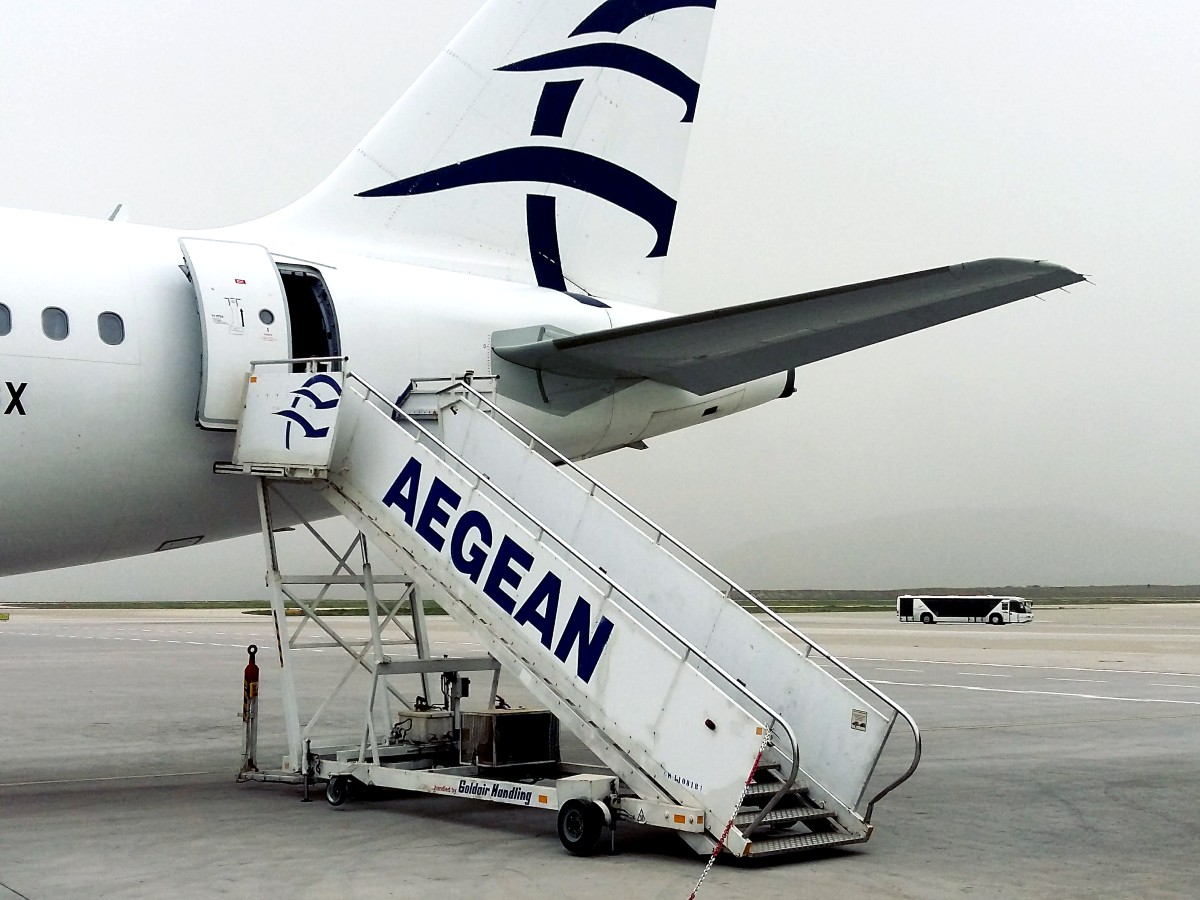If you are travelling to Greece in 2022, you will need to be aware of the ever-changing travel restrictions and rules. Here’s all you need to know if you are visiting Greece in 2022.

International Travel to Greece 2022 – Updated on 15 September 2022
As of 1 of May 2022, travel to Greece has gone back to normal. More specifically, a vaccination / recovery certificate or a PCR / rapid antigen test are no longer necessary to enter Greece!
Moreover, no such documentation is needed within Greece. All venues are accessible to everyone.
Masks remain mandatory in indoor ferry spaces, and all urban public transportation, such as the Athens metro or buses. You may also be asked to use a mask in certain museums or other venues.
You can read more information in this article.
****************************
**The information below refers to the period before 1 May 2022 – it’s here only for historical purposes**.
Travel to Greece in 2022 is currently open to everyone. However, if you are travelling to Greece in 2022, you should be aware of the existing travel regulations.
This article summarizes the rules that are in place until 1st May 2022 for anyone arriving to Greece by air, sea or land. In addition, you should be familiar with the Covid-related measures in Greece 2022.
Until 30 April, travellers who have not been vaccinated will face certain restrictions while in Greece. Most of these restrictions will be lifted on the 1st of May.
1. European Union Digital Covid Certificate System
Like many more countries, Greece is following the European Union Digital Covid Certificate System.
According to this system, travellers from the EU / Schengen and 37 non-EU countries and territories can visit Greece with either their vaccination certificate, their recovery certificate, or a PCR / rapid antigen test.
Here are the 37 non-EU countries who have joined the EU Covid Certificate System so far:
Albania, Andorra, Armenia, Benin, Cape Verde, Chinese Taipei, Colombia, El Salvador, Faroe Islands, Georgia, Iceland, Israel, Jordan, Lebanon, Liechtenstein, Malaysia, Moldova, Monaco, Montenegro, Morocco, New Zealand, North Macedonia, Norway, Panama, San Marino, Serbia, Singapore, Switzerland, Thailand, Togo, Tunisia, Turkey, Ukraine, United Arab Emirates, United Kingdom, Uruguay and Vatican City.
In addition to travellers from these 37 countries, travellers from USA, Canada and Australia can also travel to Greece with one of the above documents. This means that they no longer need to take a test if they have a valid vaccination / recovery certificate.
For more information on what constitutes a valid vaccination / recovery certificate, check Section 4 below.
These requirements apply for all travellers aged 5 and above.
2. Travellers from countries which haven’t joined the EU Covid Certificate System
Travellers aged 5 and above from all other countries will need a negative PCR / rapid antigen test to travel to Greece, irrespective of their vaccination / recovery status.
Such countries are South Africa, Brazil, Argentina etc.

3. EU Covid Certificates 2022
If you are travelling from the EU, the Schengen zone, or one of the 37 countries mentioned above, you can travel to Greece with one of the following types of EU Digital Covid Certificate:
(a) a vaccination certificate including the basic vaccination series – this becomes valid when 14 days have passed since the last dose of your vaccine, and is valid for 9 months thereafter
(b) a vaccination certificate including the booster dose – this is valid indefinitely
(c) a certificate of recovery – this becomes valid when 14 days have passed since the date of the first positive PCR / rapid test result, and remains valid for 180 days since the date the test was taken
(d) a negative PCR test, taken no more than 72 hours before the scheduled arrival time to Greece
(e) a negative rapid antigen test, taken no more than 24 hours before the scheduled arrival time to Greece
Note that, if you are taking a PCR / rapid test, you need to take it no more than 72 / 24 hours of your scheduled arrival time to Greece, rather than your scheduled departure time from your country.
4. PLF form for travel to Greece 2022
From 15th March 2022, passengers no longer need to complete the PLF form to visit Greece. You can find more info at the official Greek travel website.
5. What happens if you test positive when you arrive to Greece
The Greek authorities will be administering PCR / rapid Covid tests to randomly selected travellers flying into Greece, at their point of entrance.
Passengers who test positive will have to self-isolate for 5 days, either at home or at an appropriate temporary residence designated by the authorities. The 5-day period begins on the next day of the positive diagnosis.
After the 5-day period, travellers with no symptoms and no fever for the past 24 hours no longer need to self-isolate. Travellers who still have fever will need to remain in self-isolation, until the fever recedes.
All travellers who have self-isolated will need to wear a KN95 / FFP2 mask for at least 5 days after the end of their self-isolation period.
Always check the official website for more information. In case of doubt, please get in touch with your airline or your embassy.
6. People travelling together / Close contacts
The following rules apply to passengers travelling together with a person that has been found positive to Covid-19 (close contacts).
These passengers can choose to return to their country on the same or the next day, provided they have tested negative twice within the last 24 hours (PCR test or rapid antigen test). They will need to use a KN95 mask on their return trip.
Close contacts with a valid vaccination / recovery certificate who decide to stay in Greece, will not need to self-isolate to begin with. They will need to use a KN95 mask at all times, and take a PCR test on the fifth day.
Close contacts without a valid vaccination / recovery certificate who decide to stay in Greece, will need to self-isolate for a period of 5 days. They will need to take a PCR / rapid test on the fifth day, and use a KN95 mask for at least 5 days thereafter.

7. How to travel around Greece in 2022
Here are the regulations for domestic travel around Greece by plane / train / ferry / bus until 30 April 2022. They are slightly different from the regulations for passengers coming to Greece from abroad.
All passengers aged 4 and above need to have one of the following documents:
(a) a vaccination certificate including the basic vaccination series – this becomes valid when 14 days have passed since the last dose of the vaccine, and is valid for 9 months thereafter
(b) a vaccination certificate including the booster dose – this is valid indefinitely
(c) a certificate of recovery – this becomes valid when 14 days have passed since the date of the first positive PCR / rapid test result, and remains valid for 180 days since the date of the first positive test
(d) a negative PCR test, taken no more than 72 hours before the scheduled travel time
(e) a negative rapid antigen test, taken no more than 48 hours before the scheduled travel time
Children from 4 to 17 years old can travel with any of the above documents, and also with a negative self-test, taken in the last 24 hours. Self-tests are available from Greek pharmacies at a cost of 5-8 euro, and you need to register the result in this paper form.
Accepted languages for any of the above documents are Greek, English, French, German, Spanish, Italian or Russian, and you can present them either in paper form or electronically. If you are coming from a country which is not following the EU System, it’s safer to have them in paper form.
Here’s a website where you can book your tickets for the Greek islands > Ferryscanner. You can compare all routes and prices, and get your ferry tickets straight to your e-mail!
8. Are there any Covid restrictions within Greece?
People who don’t have a valid vaccination / recovery certificate are currently not allowed entrance to certain indoors venues in Greece. A test is sufficient for some, but not all, venues.
Here is a summary of the Covid restrictions in Greece for 2022. They tend to change every one or two weeks, so return to the article a few days before you are planning to travel to Greece.
As of 1st May, most of these restrictions will be lifted.
9. Where can I take a Covid test in Greece?
You can take a PCR or Rapid test at medical labs all around Greece. Rapid tests are also available at most pharmacies, along with self tests that are suitable for children aged 4-17.
Here’s an article with a list of places where you can take a Covid test in Greece. Includes medical labs in Athens, Santorini, Mykonos and other popular destinations.
Official sources for the above article
- Civil Aviation Authority announcement 17 April – International travel (in Greek)
- Official Government Gazettes (in Greek) – Latest Gazettes: 1881B/16.4.2022, 1882B/16.4.2022
- Official Greek travel website (in English, but not always up to date)
- European Union Digital Covid Certificate System
Ideas for travel to Greece 2022
If you are planning a trip to Greece in 2022 (or later!), have a look at these other articles:
- A selection of 30 of the best things to do in Athens Greece
- My top reasons to visit Milos island in Greece
- My top reasons to visit Kimolos in Greece
- How many days do you need in Santorini
- My experience kayaking in Mykonos
- Tinos island, a hidden gem in the Cyclades
- Driving in Greece

Hello! I’m Vanessa, a travel writer from Athens. I’ve been keeping an eye on travel restrictions for Greece since March 2020. This article, which has last been updated on 18 April 2022, summarizes everything that travellers to Greece 2022 should know. I will be keeping the article up-to-date with all new Greece travel measures throughout 2022. So, bookmark it and check it before you travel to Greece. Please share with people who will find it helpful!

Kalimera, I find your articles really helpful. Thank you. I am confused about the rules sharing a car? We are 2 couples, can we share a hire car during our holiday in early June. Conflicting advice on Web sites. Some say no more than 3??? We are all staying at the same accommodation. We usually drive in one car whilst on holiday. Help!!!!!
Hi, thanks for your message! Yes, you can hire one normal car for 4 people – this hasn’t changed in several months so it is very unlikely that it will change again. At the moment, you are supposed to be wearing masks inside the car if you are not relatives or living together, but I doubt that anyone will really care. The restrictions will definitely be relaxed by then – do follow the article as I’m updating it whenever any changes are made. Enjoy your holiday!
Hi Vanessa, very interesting article, thank you for your effort in putting this down for us.
I got a question that it is not covered in your article and perhaps you know the answer. My partner is from Costa Ricaz, which is not part if the non-EU countries who have joined the EU digital covid certificate. Does this mean she can only be allowed into outdoors venues with a negative test despite she is been vaccinated? Also how she can get a test which is linked to an AMKA, something as a tourist she doesn’t have. She can’t even get a temporary AMKA as a tourist because she doesn’t have an AFM. In order to be accepted in an outdoors venue they venue owners need to scann your test bar code linked to you AMKA, otherwise it won’t be accepted. Any info on that please?
Hi Apostolos! She should be allowed everywhere with her paper vaccination certificate and passport. This article explains everything – I’d love to hear what happens so please let me know!
hello
Me and my 8 year old kid are travelling to Greece from Canada April 18th.I had 2 doses of phizer September 2021 no booster.
My kid is unvax
I talked with a lady from the Greek embassy of Ottawa and told me that a rapid antigen test is good for 24-48 hours prior the arrival on Athens, and am not gonna need a pcr test ,
so i scheduled a rapid test instead of a PCR because is way cheaper for both of us,
Do i have to take a pcr test instead, because my flight is scheduled
to departure from canada early morning the 18th
and the latest i could find to book for the rapid test so i stretched was 7 pm on the 17th.
With the time change difference we landing on Greece early morning the 19th
What i do;
do i go with the rapid or pay extra 300$ and go with PcR;
I’m afraid the official rules are pretty clear, it’s 24 (NOT 48) hours before scheduled arrival: “Certificate of negative test result, namely, negative molecular test result (PCR) performed up to 72 hours before the scheduled arrival or negative Rapid Antigen test result performed up to 24 hours before the scheduled arrival”. If you can take it less than 24 hours before the scheduled arrival, you will be fine. Otherwise you are risking not to be let on on the flight…